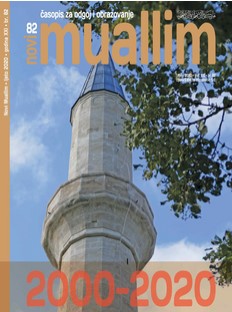ŠEJH JUJINO TUMAČENJE UČENJA O TEVHIDU ( التوحيد) JEDINOSTI BOŽIJOJ
ŠEJH JUJO’S INTERPRETATION OF THE CONCEPT OF TAWHEED
Author(s): Nedžad GrabusSubject(s): Islam studies, 17th Century, 18th Century
Published by: Rijaset Islamske zajednice u Bosni i Hercegovini
Keywords: Allah; tawheed; Ilah; positive and negative attributes; faith; aqaid;
Summary/Abstract: The article presents basic topics of Šejh Jujo’s (1651-1707) manuscript preserved in the Archives of Herzegovina in Mostar, titled ‘A brief review of Karabay’s commentary on qasida-el-Emali’. Tawheed studies take a distinctive place that is a study of the Oneness of God, a study that deals with the truth of faith, with essential issues of aqaid, with semantic levels of the noun Ilah and the meanings of the ultimate name of God, name Allah, s.w.s, throughout classical writings in the field of aqaid. Besides this the article also relates about the attributes of the Almighty God in the light of Maturidi’s teachings pertaining to positive and negative attributes and their meanings as interpreted in aqaid. Hayat is another attribute of God that is presented here. Šejh Jujo is a representative of classical Muslim thought upon which the entire Muslim intellectual thought, as well as the social habitus of Bosniaks are based. His interpretation of fundamental topics of aqaid enforces our rootedness establishment in Islamic values and helps us to better understand our own cultural, religious and scientific heritage.
Journal: Novi Muallim
- Issue Year: 2020
- Issue No: 82
- Page Range: 79-86
- Page Count: 8
- Language: Bosnian

